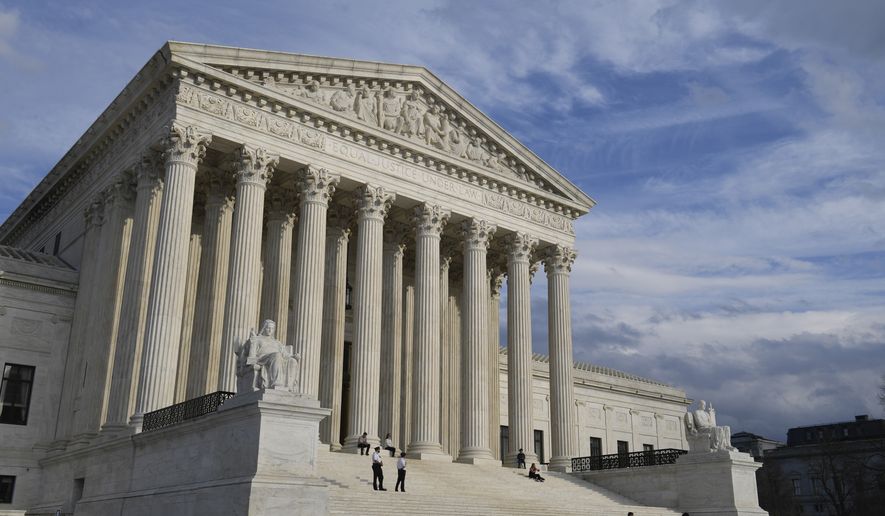The Supreme Court ruled Monday the states and federal government can separately charge someone with the same crime, calming fears from Trump critics who worried the justices would create a window for the president to abuse his pardon powers.
The court ruled that the “separate sovereigns” doctrine, which holds that the states and the federal government are independent powers, is still valid.
That means that even if the federal government has already pursued a case against someone for a crime, the states can pursue their own charges.
In a 7-2 ruling, the justices rejected a challenge by a two-time felon who argued that having both a state and the feds go after him violated the prohibition on double jeopardy, or two bites at the apple, for the same crime.
“A crime against two sovereigns constitutes two offenses because each sovereign has an interest to vindicate,” Justice Samuel A. Alito Jr. wrote for the majority.
President Trump’s critics had warned that ending the dual sovereigns doctrine would open the door to mischief, such as a presidential pardon for allies like former campaign chairman Paul Manafort.
If the court had ruled multiple prosecutions illegal, it could have created a situation in which Mr. Trump could issue a pardon at the federal level, and states would be locked out from bringing their own charges.
Other legal analysts dismissed those fears, saying enterprising state prosecutors would be able to figure out ways to bring charges.
Monday’s case involved Terance Gamble, who was pulled over in Alabama in 2015 for a broken taillight. He was found to have marijuana and a firearm — a crime in itself, given his previous felony conviction for second-degree robbery.
The state prosecuted him for the gun violation, and he served a year’s prison time. The federal government also prosecuted him for the gun violation and won a second sentence, which Gamble is serving at a high-security federal prison in Texas. He is scheduled for release in February.
Gamble’s legal team argued the two prosecutions constitute double jeopardy, in violation of the Fifth Amendment.
Justice Alito, though, said for the last 172 years the courts have recognized the separate sovereigns of states and the federal government, each with prosecution powers.
“Where there are two sovereigns, there are two laws, and two ’offences,’” he wrote.
He also said if the court were to rule for Gamble, it would upset U.S. prosecutors’ ability to bring charges for crimes that occur abroad.
“The murder of a U.S. national is an offense to the United States as much as it is to the country where the murder occurred and to which the victim is a stranger,” Justice Alito wrote.
Justice Clarence Thomas wrote a separate opinion, agreeing with the court’s judgment this time — but saying just because a doctrine has been around for 172 years doesn’t make it sacrosanct.
“Judicial decisions may incorrectly interpret the law, and when they do, subsequent courts must confront the question when to depart from them,” Justice Thomas said.
Justices Ruth Bader Ginsburg and Neil M. Gorsuch dissented.
Justice Gorsuch wrote that the prosecutorial power springs from the same fount of power, so two prosecutions is double jeopardy.
“Under our Constitution, the federal and state governments are but two expressions of a single and sovereign people,” he wrote.
Ilya Shapiro, senior fellow at the Cato Institute, said the dual sovereigns doctrine made sense when there was a large gap between crimes the states pursued and those the federal government charged. That gap has been narrowing, though, with the federal government expanding its policing efforts into areas traditionally led by the states.
“It’s a shame that the Supreme Court failed to correct the constitutional anomaly here, and to ensure that criminal defendants receive the protection against multiple prosecutions that the Fifth Amendment so plainly commands,” Mr. Shapiro said.
Michael Conway, former counsel for the House Judiciary Committee during its probe into President Richard Nixon, had been one of those warning about empowering Mr. Trump if the justices had overturned dual sovereignty.
On Monday he said the court’s ruling heads that off.
“Trump’s pardon, because of the Supreme Court ruling, will not be a ’get out of jail free card’ for anyone charged with a state crime,” Mr. Conway told The Washington Times.
Yet Mr. Conway said Justice Thomas’s view on precedent suggests future battles over long-settled areas of law, such as Roe v. Wade, the landmark decision in 1973 that established a national right to abortion.
• Alex Swoyer can be reached at aswoyer@washingtontimes.com.




Please read our comment policy before commenting.